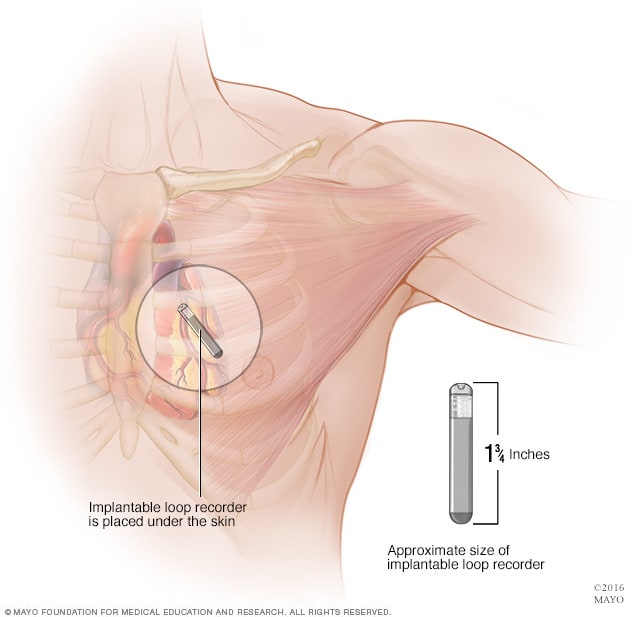Implantable loop recorder: A heart monitoring device
Implantable loop recorder

Implantable loop recorder
An implantable loop recorder is a very small device that continuously monitors the heartbeat. It stays in place under the skin of the chest for up to three years.
An implantable loop recorder is a device that records the heartbeat continuously for up to three years. It's also called a cardiac event recorder. The device tells your care provider how the heart is beating while you do your daily activities.
The small device is placed just under the skin of the chest during a minor surgery.
Why it's done
Your health care provider may recommend an implantable loop recorder if you have:
- An irregular heartbeat, called an arrhythmia.
- An unexplained stroke.
- Unexplained fainting.
An implantable loop recorder continuously checks the heartbeat for a long period of time. That means it can see changes in the heartbeat that other heart-recording devices may miss. For example, it may find irregular heartbeats that are brief or that only happen once in a while.
If you have been fainting, your health care provider may recommend this device to see if a heart problem is the cause. Information from the recorder can help your provider make a diagnosis and plan treatment.
An implantable loop recorder also may be recommended if you're at high risk of stroke. Some irregular heartbeats, such as atrial fibrillation, increase the risk of stroke.
What you can expect
Before
There's no special preparation for an implantable loop recorder.
During
An implantable loop recorder is placed under the skin on the chest. The minor surgery is usually done in a medical office or medical center.
You'll be awake for the procedure. A health care provider may give you medicine to help you relax. The provider applies medicine to the chest area to make it numb, which means you won't feel anything. The provider makes a tiny cut, inserts the device and closes the wound. The device stays in place for up to three years.
After
Complications of the procedure are uncommon. As the wound heals, check the skin for symptoms of infection such as redness or swelling. You may need to limit activities until the wound heals.
You'll be given a device called a transmitter to place beside your bed. It automatically sends information from the recorder to your health care provider while you sleep. You can also push a button to send data immediately when you have symptoms.
Your health care provider may ask you to keep a diary of your symptoms.
Results
Your health care provider receives the test results and discusses any concerns with you. You'll likely need to have health checkups once or twice a year while the device is in place.
An implantable loop recorder doesn't interfere with your daily activities. It has no patches or wires. You don't have to worry about getting the device wet while bathing or swimming.
An implantable loop recorder is considered safe for use during magnetic resonance imaging (MRI). But always let your provider know about your device before you schedule such an imaging test.
It's also possible that an implantable loop recorder might be spotted by metal detectors, for example, at an airport. Your health care provider can provide you with a device identification card to carry with you for such situations.